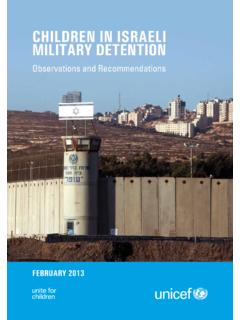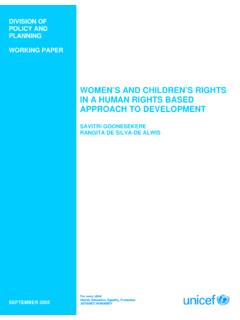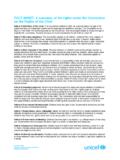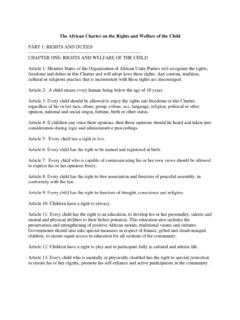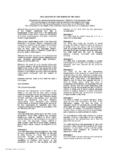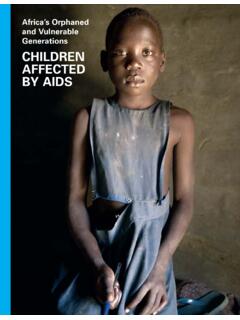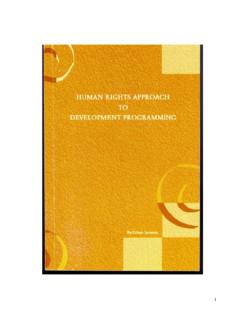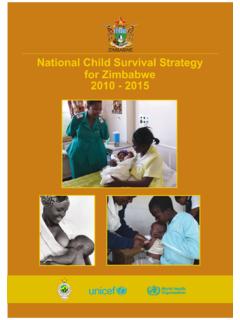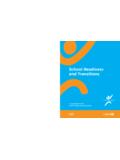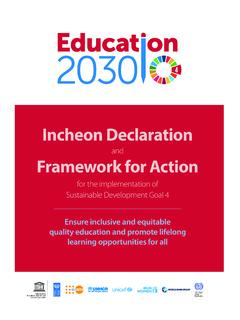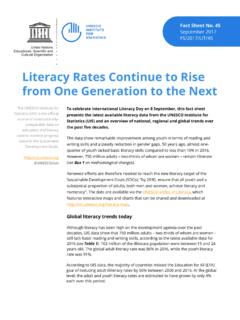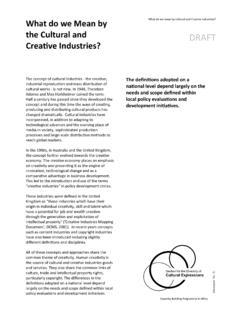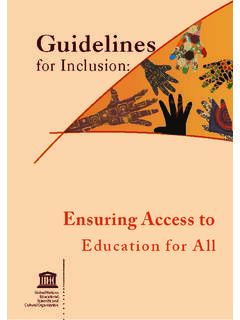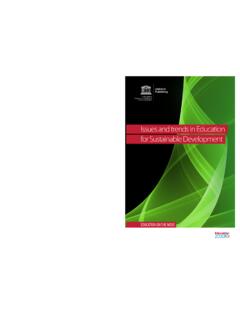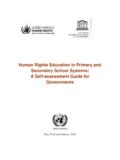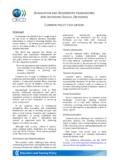Transcription of Global Framework on Transferable Skills - UNICEF
1 Global Framework on Transferable SkillsNovember 2019 Published by UNICEF Education SectionProgramme Division3 United Nations Plaza New York, NY United Nations Children s Fund ( UNICEF ) 2019 ISBN: 978-92-806-5111-9 Cover photo: UNICEF /UN0299787/RalaivitaDesign and layout by Roberto C. Rossi Global Framework on Transferable Skills is a Global public good that was developed under the guidance of the Education Section at UNICEF headquarters in New York. It is a living document that will be periodically Framework utilizes and builds upon conceptualization, research, and content developed in 2017 to produce the Middle East and North Africa Conceptual and Programmatic Framework (MENA-CPF). The MENA-CPF was developed within the scope of the Life Skills and Citizenship Education (LSCE) initiative ( ). The ongoing LSCE Initiative is led by the United Nations Children s Fund ( UNICEF ) in collaboration with the Arab League Educational, Cultural and Scientific Organization (ALESCO), ministries of education and other national institutions responsible for education across the MENA countries.
2 Other country, regional, and Global partners include Aflatoun International, the Arab Institute for Human Rights (AIHR), Birzeit University (BZU), Deutsche Post DHL Group, the International Labour Organization (ILO), the International Youth Foundation (IYF), Mercy Corps, the Norwegian Refugee Council (NRC), Save the Children, the United Nations Educational, Scientific and Cultural Organization ( unesco ), the United Nations Population Fund (UNFPA), the United Nations Refugee Agency (UNHCR), the United Nations Relief and Work Agency (UNRWA), the World Bank, and the World Food Programme (WFP).The Framework has further benefited from contributions and feedback from The United States Agency for International Development (USAID) Social and Emotional Learning Working Group, Right to Play, and UNICEF Programme Division at headquarters, regional, and country levels (Education, Gender, Adolescent Development and Participation, Water, Sanitation and Hygiene (WASH), Health, Child Protection, Social Inclusion, HIV and AIDS), and the Office of Global Insight and Framework on Transferable Skills ivGlobal Framework on Transferable SkillsContentsAbbreviations and Acronyms viExecutive Summary ixPreamble xiii1.
3 The Role of Skills in a Changing World 1 Quality learning: a Global challenge 1 Transferable Skills : the glue of all Skills 1 The key role of Transferable Skills 3 Transferable Skills to support lifelong learning 3 Transferable Skills to support a changing workforce 3 Transferable Skills to support personal empowerment and community engagement 3 Transferable Skills to cope with trauma and build resilience 6 Transferable Skills to transform learning systems 62. The Global Framework on Transferable Skills : A Skills and human rights-based vision of quality learning 9 Purpose and background 9 Working definition of Transferable Skills 9 Key principles of Transferable Skills development 10 Higher order theory of change and outcomes 123. Operationalizing the Global Framework on Transferable Skills 15 Addressing terminology challenges 15 Identifying and analysing a breadth of Transferable Skills 15 Programmatic approaches 21 Grounded in a multiple pathways approach: Equity, diversity, and flexibility 21 Programme intervention areas.
4 Teaching and Learning, Enabling Environments and System Strengthening 24 Programme action in the area of teaching and learning 25 Skills development in curricula 28 Skills development through pedagogy 31 Assessing Transferable Skills development 33 Programme Action in the Area of Enabling Environments 35 Governance and accountability mechanisms in schools and community engagement 36 Teacher wellbeing 36 Positive, safe, non-violent and inclusive learning environment 36 Positive discipline 36 Access to mental health/psycho-social support (MHPSS) 37 vGlobal Framework on Transferable SkillsContentsProgramme Action in the Area of Systems Strengthening 38 National policies, strategies, and plans 38 Coordination and multi-stakeholder partnership frameworks 39 Budgeting 39 Human resources 39 Monitoring and evaluation (M&E) 40 Conclusion 41 Annex 1: Case Studies 42 Life Skills and peacebuilding education curriculum reform in South Sudan supported by UNICEF 42 Vietnam Escuela Nueva (VNEN) supported by GPE 42 Escuelas Amigas in Peru 42 UPSHIFT supported by UNICEF 43 Nashatati: Life Skills , social cohesion and after-school activities programme in Jordan 43 Annex 2: Key Documents 45 Strategies, frameworks, and policy recommendations 45 Evidence and analysis 45 Tools and guides 46 Annex 3.
5 UNICEF -Specific Guidance 48 Skills in UNICEF Strategic Plan 2018 2021 48 Delivering on results 48 Embedding Skills development in education systems 50 Responsiveness to the demands of the labour market 50 Gender equity in opportunities for Skills development 51 Evidence and analysis 52 Planning, design, and implementation 54 Monitoring and evaluation 54 Organizational priorities 58 Capacity development 58 Partnership development 58 Endnotes 60viGlobal Framework on Transferable Skills3 EAEducation in Emergencies Evidence for ActionAIDSA cquired Immunodeficiency SyndromeC4 DCommunication for DevelopmentCASELC ollaborative for Academic, Social and Emotional LearningCBOC ommunity-Based OrganizationCCCI2 Civic Competence Composite Indicators 2 CPFC onceptual and Programmatic FrameworkCSOC ivil Society OrganizationECEE arly Childhood EducationFRESHF ocusing Resources on Effective School Health Partnership ( unesco )
6 GPEG lobal Partnership for EducationHIV Human Immunodeficiency VirusIASC-MHPSSI nter-Agency Standing Committee on Mental Health and Psychosocial SupportICCSI nternational Civic and Citizenship Education StudyICFGEOI nternational Commission on Financing Global Education OpportunityICTI nformation and Communication TechnologyILOI nternational Labour OrganizationINEEI nter-agency Network for Education in EmergenciesISCEDI nternational Standard Classification of EducationITUI nternational Telecommunication UnionIYFI nternational Youth FoundationLMS Learning Management SystemLSCELife Skills and Citizenship EducationLSELife Skills EducationM&EMonitoring and EvaluationMENAM iddle East and North AfricaMEHEM inistry of Education and Higher EducationAbbreviations and AcronymsAbbreviations and AcronymsviiGlobal Framework on Transferable SkillsMHPSS Mental Health and Psychosocial SupportMOEHEM inistry of Education and Higher EducationMoAMinistry of AgricultureMoLMinistry of LabourMoSAMinistry of Social AffairsNEETNot in Education, Employment or TrainingNESPN ational Education Sector PlansNGO Non-Governmental OrganizationNVTCN ational Vocational Training CentreOECDO rganization for Economic Co-Operation and DevelopmentPISAP rogramme for International Student Assessment (OECD)
7 RORER ates of Return to EducationSDGS ustainable Development Goal SEA-PLMS outheast Asia Primary Learning MetricSELS ocial and Emotional LearningSTEM Science, Technology, Engineering and MathematicsTIMSS Trends in International Mathematics and Science StudyTVETT echnical and Vocational Education and TrainingUISUNESCO Institute of StatisticsUN United NationsUNDP United Nations Development ProgrammeUNESCOU nited Nations Educational, Scientific and Cultural OrganizationUNFPAU nited Nationals Population FundUNGEIU nited Nations Girls Education InitiativeUNHCRU nited Nations Refugee AgencyUNICEFU nited Nations Children s FundUNRWAU nited Nations Relief and Works Agency USAID United States Agency for Development USDU nited States DollarWFPW orld Food Programme WHO World Health OrganizationxLOBE xperiential Learning Objects UNICEF /UN040839/PIROZZIixGlobal Framework on Transferable SkillsExecutive SummaryChildren and adolescents today live in a world of challenges and opportunities, including new technologies, changing labour markets, migration, conflict, and environmental and political changes.
8 To succeed within this current and future environment, all children and adolescents need access to quality education and learning that develops Skills , knowledge, attitudes and values and enables them to become successful life-long learners who can learn, un-learn, and relearn; find and retain productive work; make wise decisions; and positively engage in their communities. However, many children and adolescents remain out of school or do not have access to quality learning opportunities. Furthermore, education and learning systems worldwide are constrained in delivering positive outcomes for children and adolescents and remain mostly focused on the acquisition of knowledge that is not sufficient to prepare them to meet challenges and seize opportunities now and in the future. By 2030, an estimated 825 million children are expected to leave school without basic secondary level 39% of employers in nine diverse countries (including high income countries) claim that a leading reason for entry-level vacancies in diverse economies is due in part to a Skills Across the globe, about 500 million youth are unemployed, underemployed or working insecure jobs, often in the informal sector,3 4 5 and 255 million (21%) youth in the developing world three quarters of them women are not in employment, education or training (NEET).
9 6 7 8 Over 33% of students between the ages of 13 and 15 experience bullying from their such, there is an urgent need to expand, rethink and transform education and learning systems to provide all children and adolescents, especially those who are marginalised and in conflict and emergency settings, with quality learning opportunities that include the Skills they need to succeed in school, work, and life. Transferable Skills , also known as life Skills , 21st century Skills , soft Skills , or socio-emotional skills10 are the focus of this Framework . They allow children and adolescents to become agile, adaptive learners and citizens equipped to navigate personal, academic, social and economic challenges. Transferable Skills also support crisis-affected children to cope with trauma and build resilience in the face of adversity. Transferable Skills include problem solving, negotiation, managing emotions, empathy and communication, among others and they work alongside knowledge and values to connect, reinforce, and develop other Skills and build further knowledge.
10 Within this construct, they are the central magic glue, connecting, reinforcing, and developing other Skills (foundational Skills of literacy and numeracy, digital Skills and job-specific skills11). However, despite significant Global efforts, Transferable Skills are not developed progressively or at scale for all children and adolescents, whether in or out of school. Most governments have ambitious whole-sector policies and plans in place to develop these Skills , often guided by a national vision for economic and social development, but Executive SummaryxGlobal Framework on Transferable Skillsimplementation remains a challenge. Out of 152 surveyed countries, 117 include Transferable Skills within national policy documents, and 71 include Transferable Skills within curriculum, but only 18 define the learning standards to ensure the development of these Skills across different age/grade Within this context, The Global Framework on Transferable Skills supports UNICEF country offices, policymakers, programmers, and educators to embed Transferable Skills within different education and learning systems, resulting in the systematic development of a breadth of Transferable Skills , at scale, across the life course and through multiple learning pathways: formal, non-formal and community based.
